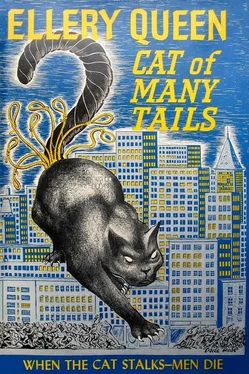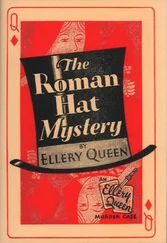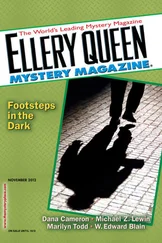Stella was the sixth of seven children. Of her three brothers, one was a priest and the two others were in business with George Petrucchi. Of her three sisters, the eldest was a nun of the Carmelite order, one was married to an Italian cheese and olive oil importer, the third was a student at Hunter College. All the Petrucchi children but the priest, who was the eldest, had been born in New York City.
They had thought at first that Stella was part of the immortal debris littering, the vicinity of Metropol Hall, overlooked in the streetcleaning. But the silk cord around the girl’s neck gave her the special distinction conferred by the Cat and they found that when they pulled her head back by the tumbled black hair and exposed her throat.
A pair of patrolmen had run across her body a block and a half from Metropol Hall at just about the time the Mayor was giving reporters the statistics of the carnage. It was lying on the cement of an alley between two stores, ten feet from the Eighth Avenue sidewalk.
She had been strangled, said the Medical Examiner’s man, some time before midnight.
The identification was made by Father Petrucchi and the married sister, Mrs. Teresa Bascalone. Mr. and Mrs. George Petrucchi collapsed on being informed of the tragedy.
A man, Howard Whithacker, 32, who gave a West 4th Street rooming house address, was closely questioned.
Whithacker was a very tall, lean, blackhaired man with closely set diamond black eyes, a horny skin, and Gothic cheekbones. He looked considerably older than the age he gave.
His occupation, he stated, was “unsuccessful poet.” On being pressed, he grudgingly admitted that he “kept body and soul together” by working as a counterman in a Greenwich Avenue cafeteria.
Whithacker said that he had known Stella Petrucchi for sixteen months. They had met in the cafeteria late one night the previous spring. She had been out on a date and had stopped in with her escort at two in the morning. The escort, “a deep Bronx troglodyte with handpainted mermaids on his tie,” had jeered at Whithacker’s midwestern speech. Whithacker had picked up a baked apple from the counter between them, leaned over, and crammed the apple into the offending mouth. “After that, Stella used to drop in almost every night and we became kind of friendly.”
He denied angrily having had an affair with the girl. When this line of questioning persisted, he became quite violent and had to be subdued. “She was a pure, sweet soul,” he yelled. “Sex with her was out of the question!”
Whithacker talked reluctantly about his background. He hailed from Beatrice, Nebraska. His people were farmers; the original stock had been Scotch — a great-grandfather had come up out of Kentucky in 1829 in a group of Campbellites. There was Pawnee blood in the family and a splatter of Bohemian and Danish. “I’m one of the percentage Americans,” said Howard Whithacker. “All decimal points. You know?” At home, he said, he attended the Disciples of Christ church.
He was a graduate of the University of Nebraska.
At the beginning of the war he had enlisted in the Navy, “winding up in the Pacific. I was blown into the water by a kamikaze who darn near made it. My ears still ring sometimes. It had a remarkable effect on my poetry.”
After the war, finding Beatrice confining, he went to New York — “financed by my brother Duggin, who thinks I’m poetry’s gift to Gage County, Nebraska.”
His sole published work since his arrival two years before consisted of a verse entitled “Corn in the Coral.” It had appeared in Greenwich Village’s newspaper, the Villager, in the spring of 1947; Whithacker produced a greasy clipping to prove it. “My brother Duggin is now convinced I’m not another John Neihardt. However,” he said, “I have received considerable encouragement from fellow-poets in the Village, and of course Stella adored me. We have regular 3 A.M. poetry-reading sessions in the cafeteria. I live Spartanly but adequately. The death of Stella Petrucchi leaves an empty pigeonhole in my heart; she was a dear child without a brain cell in her head.”
He denied indignantly having taken money from her.
As to the events of the night of September 22, Whithacker stated that Thursday night being his night off, he had met Stella outside her office building to take her to the Metropol Hall mass meeting. “A cat poem had been taking shape in my mind for some time,” he explained. “It was important that I attend. Stella, of course, always looked forward to our Thursday nights together.”
They had walked crosstown, stopping in at an Eighth Avenue spaghetti house “owned by a cousin of Stella’s father. I discussed the Citizens’ Action Teams movement with Mr. Ferriquancchi and we were both surprised to find that the subject made Stella extremely nervous. Ignazio said we oughtn’t to go if Stella felt that way and I offered to go alone, but Stella said no, she wanted to go, at last somebody was doing something about the murders. She said she asked the Virgin Mother every night to keep everyone she knew safe.”
They had managed to get into Metropol Hall and had found downstairs seats well to the front of the auditorium.
“When the stampede started, Stella and I tried to hold on to each other, but the damn cattle tore us apart. The last I saw of her she was being carried off in a crowd of lunatics, screaming something at me. But I couldn’t hear. I never saw her alive again.”
Whithacker had been lucky, suffering no more than a torn pocket and some pummeling.
“I crowded with a few other people in a doorway across from the Hall to keep out of harm’s way. When the worst was over I started searching for Stella. I couldn’t find her among the dead or injured at the Hall so I began looking along Eighth Avenue, the side streets, Broadway. I wandered around all night.”
Whithacker was asked why he had not telephoned to the Petrucchis; the family had been up all night frantic over Stella’s failure to come home. They had not known about her appointment with him.
“That’s the reason. They didn’t know about me. Stella said it was better that way. She said they were strict Catholics and it would only cause a ruckus if they found out she was going around with a non-Catholic. She didn’t mind her father’s cousin Ignazio knowing about us, she said, because Mr. Ferriquancchi is anti-Papist and nobody in the Petrucchi family has anything to do with him anyway.”
At 7:30 A.M. Whithacker had returned to Metropol Hall for another checkup, intending to telephone the Petrucchis “despite their religious scruples” if this last effort to locate Stella failed.
At his first question he was seized by the police.
“I must have passed the entrance to that alley a dozen times during the night,” Howard Whithacker said. “But it was dark, and how was I to know Stella was laid out in there?”
Whithacker was held “for further questioning.”
“No,” Inspector Richard Queen told reporters, “we have absolutely nothing on him. But we want to check his story, and so on.” The “and so on” was taken by the press — correctly — to refer both to related matters in the recent past and to a certain interesting wildness of eye, manner, and speech in Stella Petrucchi’s friend.
There was no medical evidence of rape or attempted rape.
The girl’s purse was missing; but it was found later, its contents intact, in the debris of the Hall. A gold religious medal on a fine chain about her neck had not been touched.
The strangling cord was of the familiar tussah silk, dyed salmon-pink. It had been knotted at the nape exactly as in the previous cases. Laboratory examination of the cord turned up nothing of significance.
It seemed clear that Stella Petrucchi had taken refuge in the alley after being hurled into the street with the rest of the Metropol audience. But whether the Cat had been waiting for her in the alley, or had entered with her, or had followed her in, there was no way of telling.
Читать дальше












